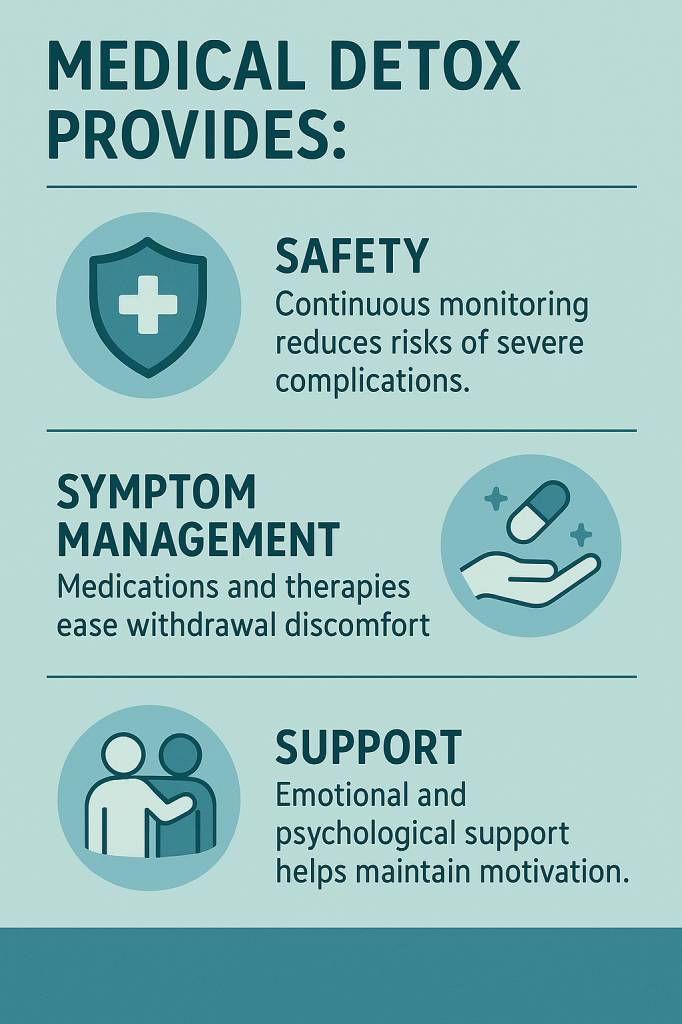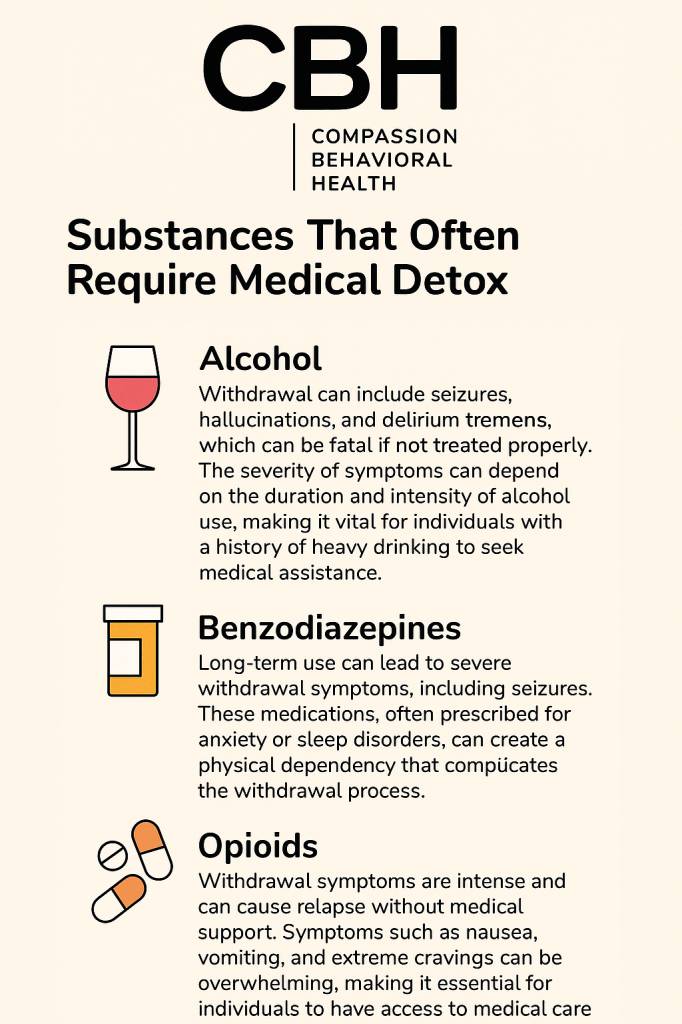Summary
Medical detox is a critical first step for individuals seeking recovery from substance use disorders. It involves the supervised withdrawal from drugs or alcohol, ensuring safety and comfort while managing potentially severe withdrawal symptoms. This comprehensive guide explores what medical detox entails, who needs it, how it works, and why it is a vital component of addiction treatment. With statistics highlighting the prevalence of substance use disorders and the risks associated with unsupervised detox, this article aims to provide clear, factual, and compassionate information for those considering or supporting someone through detoxification.
Understanding the medical detox process is essential for both individuals and their loved ones. During detox, patients are monitored by healthcare professionals who can administer medications to alleviate withdrawal symptoms and provide emotional support. This phase can last anywhere from a few days to several weeks, depending on the substance involved and the severity of the addiction. For instance, alcohol withdrawal can lead to serious complications such as delirium tremens, which requires immediate medical intervention. Therefore, having a structured environment where medical personnel can respond promptly to any complications is crucial for a successful detox experience.
Moreover, medical detox is not just about physical withdrawal; it also addresses the psychological aspects of addiction. Many individuals experience intense cravings and emotional distress during this time, which can lead to relapse if not properly managed. Therapeutic interventions, such as counseling and support groups, may be integrated into the detox process to help individuals develop coping strategies and build a foundation for long-term recovery. By addressing both the physical and psychological components of addiction, medical detox sets the stage for a more comprehensive treatment plan that can lead to sustained recovery and improved quality of life.
Understanding Medical Detox: Definition and Purpose
Medical detox, short for medical detoxification, is the process of eliminating toxic substances—such as alcohol, opioids, benzodiazepines, or other drugs—from the body under professional medical supervision. Unlike quitting “cold turkey,” medical detox provides a controlled environment where healthcare professionals can monitor vital signs, manage withdrawal symptoms, and intervene if complications arise.
The primary purpose of medical detox is to safely navigate the physical and psychological challenges of withdrawal. Detox itself is not a cure for addiction but rather the essential first phase that prepares individuals for ongoing treatment and recovery. It serves as a critical stepping stone, allowing individuals to regain their physical health and mental clarity before embarking on the often challenging journey of rehabilitation.
Why Is Medical Detox Important?

Withdrawal symptoms can range from mild discomfort to life-threatening conditions depending on the substance, duration of use, and individual health factors. For example, alcohol withdrawal can cause seizures or delirium tremens, which can be fatal without proper care. Opioid withdrawal, while rarely fatal, can be intensely painful and overwhelming, often leading to relapse if not managed effectively. The severity of these symptoms underscores the necessity of a medically supervised detox process, where trained professionals can offer immediate assistance and support.
Medical detox provides:
- Safety: Continuous monitoring reduces risks of severe complications.
- Symptom Management: Medications and therapies ease withdrawal discomfort.
- Support: Emotional and psychological support helps maintain motivation.

Moreover, medical detox is tailored to the individual’s specific needs, taking into account their medical history, the substance involved, and any co-occurring mental health disorders. This personalized approach not only enhances safety but also increases the likelihood of successful detoxification. In many facilities, including Compassion Behavioral Health, a multidisciplinary team, including doctors, nurses, and mental health professionals, works collaboratively to create a comprehensive care plan that addresses both the physical and emotional aspects of addiction. This holistic method is crucial, as it recognizes that addiction is not merely a physical dependency but a complex interplay of psychological, social, and biological factors.
Additionally, the environment of a medical detox facility is designed to be supportive and therapeutic. Many programs incorporate holistic therapies such as yoga, meditation, and nutritional counseling, which can significantly aid in the recovery process. These complementary approaches help individuals reconnect with their bodies and minds, fostering a sense of well-being that is often lost during active addiction. By addressing the whole person, medical detox not only alleviates withdrawal symptoms but also lays the groundwork for a healthier lifestyle moving forward.
Who Needs Medical Detox?
Not everyone who stops using substances requires medical detox, but certain factors increase the necessity for professional supervision. Understanding these factors is crucial for ensuring a safe and effective withdrawal process, as the risks associated with detoxing can vary significantly from person to person.
Substances That Often Require Medical Detox
Some substances are associated with more dangerous withdrawal syndromes, making medical detox highly recommended or essential:
- Alcohol: Withdrawal can include seizures, hallucinations, and delirium tremens, which can be fatal if not treated properly. The severity of symptoms can depend on the duration and intensity of alcohol use, making it vital for individuals with a history of heavy drinking to seek medical assistance.
- Benzodiazepines: Long-term use can lead to severe withdrawal symptoms, including seizures. These medications, often prescribed for anxiety or sleep disorders, can create a physical dependency that complicates the withdrawal process.
- Opioids: Withdrawal symptoms are intense and can cause relapse without medical support. Symptoms such as nausea, vomiting, and extreme cravings can be overwhelming, making it essential for individuals to have access to medical care and support during this challenging time.
- Barbiturates and other sedatives: Risk of life-threatening withdrawal symptoms. These substances can depress the central nervous system, and withdrawal can lead to severe complications, including respiratory failure.

Individual Risk Factors
Beyond the substance itself, individual health and history play a role in determining the need for medical detox:
- History of severe withdrawal symptoms or seizures. Individuals who have previously experienced intense withdrawal may be at a higher risk for complications and should consider medical detox as a safer option.
- Co-occurring mental health disorders. Conditions such as depression or anxiety can complicate the detox process, making it essential to have a comprehensive treatment plan that addresses both substance use and mental health.
- Chronic medical conditions, such as heart disease or liver problems. These conditions can exacerbate withdrawal symptoms and increase the risk of serious health complications during detox, necessitating close medical supervision.
- Long-term or heavy substance use. The longer and more heavily a person has used a substance, the more likely they are to experience severe withdrawal symptoms, underscoring the importance of a medically supervised detox.
- Previous unsuccessful attempts at quitting without medical supervision. Past experiences can inform current treatment approaches, as individuals who have struggled to quit on their own may benefit significantly from the structured support that medical detox provides.
In addition to these factors, the environment in which a person is attempting to detox can also play a significant role in their success. A supportive and stable environment can help mitigate stress and reduce the likelihood of relapse.

Conversely, an unstable or triggering environment may increase the risk of returning to substance use. Therefore, creating a conducive atmosphere for recovery, whether through inpatient care or a supportive home setting, is crucial for those undergoing detox.
Furthermore, the psychological aspect of detox cannot be overlooked. Many individuals face emotional challenges as they confront their substance use and the reasons behind it. This emotional turmoil can be heightened during withdrawal, making it essential for individuals to have access to counseling and support services. Engaging in therapy during detox can help individuals process their feelings and develop coping strategies, which are vital for long-term recovery.
How Does Medical Detox Work?
Medical detox typically takes place in specialized facilities such as hospitals, inpatient rehab centers, or dedicated detox clinics. The process is individualized based on the substance, severity of dependence, and patient needs.
Assessment and Evaluation
Before detox begins, a thorough assessment is conducted. This includes:
- Medical history review
- Physical examination
- Psychiatric evaluation
- Laboratory tests to check organ function and detect coexisting conditions
This evaluation helps healthcare providers develop a tailored detox plan that addresses both physical and psychological aspects of withdrawal.
Detoxification Process
During detox, the patient is closely monitored, often 24/7, to manage symptoms and prevent complications. Key components include:
- Medication Management: Medications such as benzodiazepines for alcohol withdrawal or methadone and buprenorphine for opioid detox can be used to ease symptoms and reduce cravings.
- Supportive Care: Hydration, nutrition, and comfort measures are prioritized.
- Psychological Support: Counseling and reassurance help patients cope with anxiety, depression, or fear during withdrawal.
Duration of Detox
The length of medical detox varies widely depending on the substance and individual factors. For example:
- Alcohol detox: Typically lasts 5 to 7 days but can extend if complications arise.
- Opioid detox: Can last from 7 to 14 days or longer, depending on the medication used and the tapering schedule.
- Benzodiazepine detox: Often requires a slow taper over weeks to months to avoid severe withdrawal symptoms.
Medical Detox vs. Other Detox Methods
Understanding the differences between medical detox and other detox approaches is important for making informed decisions.
Cold Turkey Detox
Stopping substance use abruptly without medical assistance is known as “cold turkey.” While some people attempt this method, it carries significant risks, especially with substances like alcohol and benzodiazepines. Withdrawal symptoms can be unpredictable and dangerous, and the lack of support often leads to relapse.
Outpatient Detox
Outpatient detox allows individuals to receive medical supervision while living at home. This approach may be suitable for those with mild dependence, strong support systems, and no history of severe withdrawal symptoms. However, outpatient detox requires high motivation and access to immediate medical care if symptoms worsen.
Inpatient Detox
Inpatient or residential detox provides 24-hour medical supervision in a controlled environment. This setting is ideal for moderate to severe dependence or when co-occurring medical or psychiatric conditions exist. It offers the highest level of safety and support but can be more costly and disruptive to daily life.
What Happens After Medical Detox?
Detox is only the first step in the recovery journey. Without follow-up treatment, relapse rates remain high. According to the National Institute on Drug Abuse (NIDA), relapse rates for substance use disorders can range between 40-60% without comprehensive treatment.
Transition to Rehabilitation
After detox, patients are typically encouraged to enter a rehabilitation program. This may include:
- Inpatient or outpatient rehab: Focuses on therapy, counseling, and skill-building to maintain sobriety.
- Behavioral therapies: Cognitive-behavioral therapy (CBT), motivational interviewing, and contingency management.
- Medication-assisted treatment (MAT): For some substances, ongoing medications help reduce cravings and prevent relapse.
Support Systems and Aftercare
Long-term recovery often depends on building strong support networks, including:
- Peer support groups like Alcoholics Anonymous (AA) or Narcotics Anonymous (NA)
- Family counseling and involvement
- Ongoing mental health care
Common Myths and Misconceptions About Medical Detox
There are many misconceptions about medical detox that can deter individuals from seeking help. Addressing these myths is crucial for encouraging informed decisions.

Myth: Detox Alone Is Enough to Overcome Addiction
Detox addresses physical dependence but does not tackle the psychological, behavioral, and social aspects of addiction. Comprehensive treatment is necessary for lasting recovery.
Myth: Detox Is Always Painful and Uncomfortable
While withdrawal can be challenging, medical detox uses medications and supportive care to minimize discomfort. Many patients report feeling safer and more comfortable than when attempting to quit alone.
Myth: Detox Is Only for Severe Addictions
Even individuals with mild or moderate substance use may benefit from medical detox, especially if they have underlying health issues or co-occurring disorders.
Statistics Highlighting the Need for Medical Detox
Understanding the scope of substance use disorders underscores the importance of medical detox services:
- According to the 2022 National Survey on Drug Use and Health (NSDUH), approximately 40 million Americans aged 12 or older reported substance use disorders.
- Only about 10% of those needing treatment receive it, highlighting a significant treatment gap.
- Alcohol-related hospitalizations in the U.S. have increased by nearly 50% over the past decade, often requiring medical detox intervention.
- The opioid epidemic continues to drive demand for medically supervised detox, with over 80,000 opioid overdose deaths reported in 2022.
Choosing a Medical Detox Program
Selecting the right medical detox facility is a crucial decision that can impact recovery outcomes. Consider the following factors:
Accreditation and Licensing
Ensure the facility is accredited by recognized organizations such as The Joint Commission or CARF (Commission on Accreditation of Rehabilitation Facilities) and licensed by state health departments.
Compassion Behavioral Health is proudly accredited by the Joint Commission, the Florida Agency for Health Care Administration (AHCA), and the Florida Department of Children and Families (DCF).
Qualified Medical Staff
Look for programs staffed by experienced physicians, nurses, addiction specialists, and mental health professionals.
Individualized Treatment Plans
Effective detox programs tailor care to each patient’s unique needs, including co-occurring disorders and personal preferences.
Aftercare Planning
A comprehensive program will provide a clear transition plan to rehabilitation and ongoing support services.
Facility Environment
Comfortable, safe, and supportive surroundings can greatly enhance the detox experience.
Medical Detox Program at Compassion Behavioral Health in Florida

Medical detox is a vital, often life-saving step in the journey toward recovery from substance use disorders. By providing a safe, supervised environment to manage withdrawal symptoms, medical detox lays the foundation for successful long-term treatment. Understanding the process, risks, and benefits empowers individuals and their loved ones to make informed decisions and seek the help they need. With the right support and resources, recovery is possible, and medical detox is often the first step on that path.
If you or a loved one is ready to take the first step towards recovery from substance use disorders, Compassion Behavioral Health is here to guide you through the journey. Our specialized team in South Florida is committed to providing personalized detox programs that address both your mental and physical health needs. With our customized approach and supportive environment, we aim to be your beacon of hope and help you achieve sustainable recovery. Don’t wait to reclaim your life. Call Us Today and let us support you in laying the foundation for a healthier, substance-free future.



